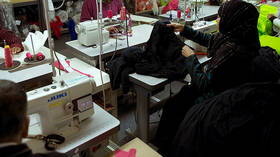The discovery of a Leicester sweatshop sums up how UK’s workers have been let down by spivs and politicians over the last 20 years

Dodgy businessmen and bureaucrats, and weak unions, have meant the 2000s have brought misery for Britain’s working class. Now is the time to stop the exploitation and end the country’s vast wealth inequality.
I don’t buy into the right-wing argument that black and brown people and migrants are currently most at risk from Covid-19 because of their own actions or their ‘cultural norms’.
What Covid-19 has done is lift the masks that have been hiding exploitation and inequality in our system – and nothing has been as stark in opening this can of worms than the city of Leicester’s recent return to lockdown.
I know Leicester quite well; I used to work there in the 1990s. My mum, who was a representative for the National Union of Knitwear, Footwear and Apparel, visited Leicester weekly, as the union’s head office was located there due to the number of factories in the area and throughout the East Midlands. Both the industry and the union have ceased to exist.
Leicester is a great city; it’s not only the most diverse city in the country, but it’s one of the friendliest. When I heard that it was to be locked down again, I felt real empathy with the community.
But worse was to come, with the initial media consensus suggesting the Covid-19 spike might be due to that diversity and friendliness – those ‘cultural norms’ – squarely laying the blame on the people of Leicester themselves.
What we have learned recently gives some context to this story, which really isn’t just about Leicester but about the working class in Britain, especially those in the post-industrial areas and migrant workers.
Also on rt.com Britain’s Leicester lockdown is an unjustifiable travesty, based on shoddy figures and a bungled reportAn undercover journalist working for the Times recently shared their experience of working during the lockdown period in a Leicester sweatshop, where workers are earning £3.50 an hour and their safety has been shown as totally secondary to profit.
The lockdown has increased the public’s interest in shopping online, and so Boohoo, the benefactor of the Leicester sweatshops, has been coining it in – or at least it was, until the revelations of the past few days explained how they do ‘fast fashion’ by exploiting British workers.
The value of the online fashion retailer has now plunged by more than £1.5bn.
I remember my mum talking to me in the 1970s and 1980s about sweatshops that existed in Leicester, along with Nottingham, Birmingham and Derbyshire and in London’s East End. Her union ran a massive campaign to get them unionised or in some cases closed down, and by the mid- 1990s they had all but disappeared. At the same time the textile manufacturing industry was also disappearing from our shores.
So there has been a degree of shock in learning that the sweatshops have returned in the East Midlands, and that your summer dress has not been made by exploited faceless people in some far-off foreign land, but by the same in the middle of England.
Also on rt.com British politicians and the MSM have sent a clear message to the white working class for decades: 'You don’t matter'In all honesty, I am not surprised; it was always a matter of time. After the devastation left by de-industrialisation and the feeding of steroids to a finance economy in the form of deregulation – plus the elevation of the roles of banker, commodity trader and financial broker to God-like status – a clear gap has appeared in the UK.
If it was in physical form, it would look like a series of Grand Canyons separating the Midlands, the North and the coastal areas away from London and South East. The devastation has been that stark.
Consequently, during the early 2000s, local councils in the devastated areas courted any industry that would come, and the distribution centres arrived. The new ‘satanic mills’ were created by tax breaks, European funding and infrastructure projects that saw A-roads used mainly by lorries carved into the country’s heartlands.
The spiv businessman was also on the rise again, opening up terrible places to work, using high security to keep out unwanted scrutiny from the media, the public, and what is left of the tepid trade unions.
Mike Ashley of Sports Direct and Mahmud Kamani of Boohoo are such spiv industrialists, making billions and being celebrated and rewarded for their exploitation with government grants and bailouts.
But now, finally, the curtain is rising on these spivs, backroom sweatshops and terrified workers.
Also on rt.com Britain’s working class need a New Deal that overhauls housing, education and benefits to see them through the post-Covid crisisEnough is enough. The 2000s have been truly awful – a full bonanza of excess, the greed of the spiv bosses, the dodgy bureaucrats in Westminster and town halls, and, of course, the weak British unions. Most of these seem more interested in getting involved in party politics and working with the government than getting back into the shop floors, training and educating workers to fight for themselves like my mum did in the past.
Is it any surprise that union membership within the private sector has never been lower, while the spiv industrialist reigns supreme? The ONS showed how income inequality was rising back in February 2020; imagine where we will be by 2021.
There are a number of complicated threads to pull together from this one story of rising Covid-19 cases in Leicester.
But among them is the fact that working-class migrants and people of colour are not responsible for the economic position they are in, which puts them at risk; that our society is deeply divided on economic class lines; and that fast fashion is exploitative, and we do not need a pair of jeans made in misery.
Our industrial or de-industrial history is important to our past, present and future. Places like the East Midlands need industries that allow people to be skilled, educated and paid well. Making clothes for other people can, and should, be a joy in the right conditions, not a nightmare created by the new spivs in business, politics and the unions.
Think your friends would be interested? Share this story!
The statements, views and opinions expressed in this column are solely those of the author and do not necessarily represent those of RT.















